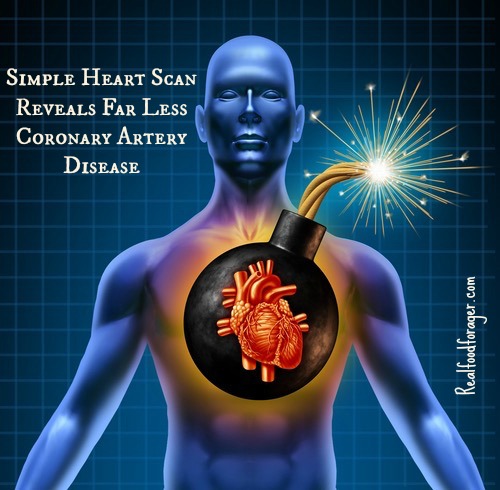A new study of atherosclerosis (calcification of the coronary arteries) shows that use of a relatively cheap test could evaluate whether or not people under conventional medical treatment who have high LDL cholesterol actually need statins. This could be a game breaker for the statin industry.
In light of the recent new guidelines on cholesterol management that extends use of statins to 13 million more Americans than under the previous guidelines, this is rather heartening!
As you may know, if you have been reading this blog, I am not in favor of statins in most cases and I don’t believe that cholesterol has much to do with heart disease at all. In fact, I think we need to avoid statins and embrace our cholesterol because it is a critical nutrient.
This relatively cheap test, called a Coronary Artery Calcium screening (CAC) will hopefully become more of a standard screening test in order to rule out the flagrant use of statins that exists today.
Imaging of the Coronary Arteries
Computed Tomography Coronary Artery Calcium Score or CT CACS is a way of measuring the amount of calcification of plaque in the arteries. The amount of calcium seen on CT is related to the amount of underlying coronary atherosclerosis (hardening of the arteries of the heart).
It is a CT scan, so it has the drawback of exposing the patient to ionizing radiation. But, as with any medical intervention you have to take into consideration the risk versus the benefit. The benefit in knowing this score may well override the small amount of radiation you get.
A high coronary artery calcium score from a CT scan can help to predict fatal and nonfatal heart attacks or the need for coronary bypass surgery or coronary (balloon) angioplasty in the next one to two years. A low calcium score suggests a very low risk for blocked coronary arteries and coronary events.
A score of zero is great, less than 100 is moderate, over 100 indicates plaque growth and over 400 indicates a grave condition. It can tell you where exactly the plaque is located.
It is not useful for someone who already has a diagnosed heart disease. It could be very useful for someone with no symptoms over age 40.
The American College of Cardiology came out with a statement in 2011 that if you have risk factors, the CAC is endorsed.
Get your calcium score, especially if you have some risk factors such as:
- known heart problems
- high blood pressure
- Blood sugar problems
- Family history of heart problems
This technology may not be covered by some insurance policies because it is newer. It does need a prescription by a physician.
The Multi-Ethnic Study of Atherosclerosis
The study, published in the Journal of the American College of Cardiology in 2015, called the Multi-Ethnic Study of Atherosclerosis investigated the implications of the absence of coronary artery calcium buildup, in order to reclassifying patients from a guideline in which statins are recommended, to one in which they are not recommended .
The results of this study showed that from a population of 4758, under the current guidelines, 77% were eligible for statin therapy because of estimated risk. However, of those who were recommended statins, 41% had a CAC score of zero and had 5.2 atherosclerotic cardiovascular disease (ASCVD) events/1,000 person-years.
Among 589 participants (12%) who were considered for moderate-intensity statin therapy, 338 (57%) had a CAC score of zero with an ASCVD event rate of 1.5 per 1,000 person-years. Of participants eligible (recommended or considered) for statins, 44% (1,316 of 2,966) had CAC score of zero at baseline and an observed 10-year ASCVD event rate of 4.2 per 1,000 person-years.
What this means is that in each case, (those eligible for moderate-intensity statin therapy and those eligible to be recommended for statin therapy) 57% and 44%, respectively, there was ZERO calcium buildup in their coronary arteries.
This means that statin therapy is not needed and all those people who thought they have coronary artery disease, in fact, DID NOT.
The researchers concluded,
Significant ASCVD risk heterogeneity exists among those eligible for statins according to the new guidelines. The absence of CAC reclassifies approximately one-half of candidates as not eligible for statin therapy. (my emphasis)
A Personal Story
In light of all this new information, I encouraged my husband to have the CAC screening done, to finally put to rest any concerns he had about his high cholesterol and eating animal fats.
Of course, his diet had very few additives, very little sugar and is mostly home cooked meals using real food, lots of coconut products, fresh organic produce and animal products from grassfed animals.
He has always been athletic, was a runner for 35 years and now works out at a gym every morning. He has very little body fat and is in great shape.
The only issue is the high total cholesterol and high LDL according to conventional standards. His concern is that his father died of a heart attack at age 60, however, he was a heavy smoker.
Over the years my husband’s cholesterol has been slowly increasing. When I heard about this test I suggested he talk to a cardiologist. He did and the doctor said sure.
We discussed the amount of radiation and felt that finding out if there was indeed any plaque was more important than a small bit of radiation.
He had the test.
He got the results.
Guess what his score was…
ZERO.
Wow. I didn’t expect zero. Needless to say, we were very pleased. Now he is more confident that our diet is just right.
What about you? Are you concerned because you have high cholesterol? If so, maybe it’s time you requested the CAC screening.
Leave a comment and let me know!
Related Article:
- The REAL Cause of Heart Disease — NOT Cholesterol!
- The Most Important Blood Marker for Health and Longevity — Not Cholesterol!
- 5 Reasons to Love Cholesterol
- How to Test for Plaque in Your Arteries and What to do If You Have It












